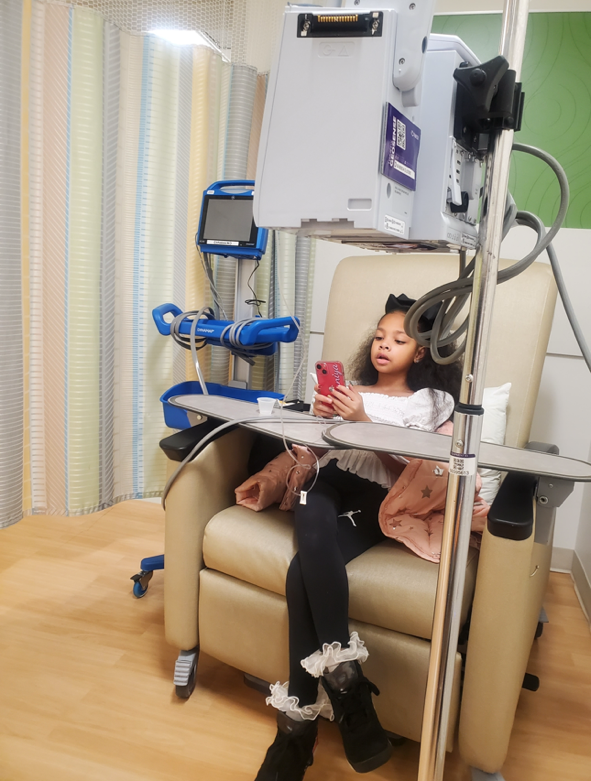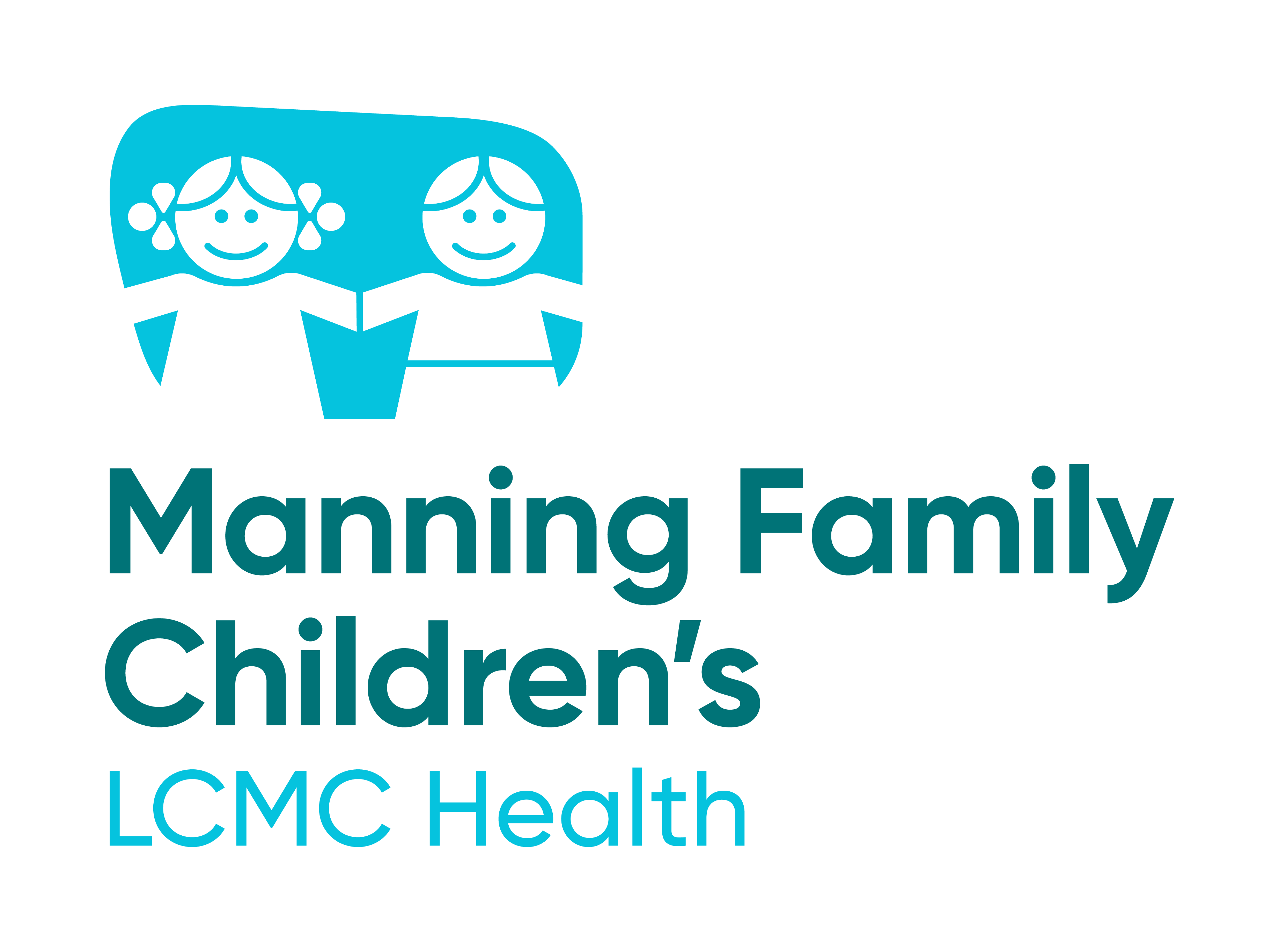How a Groundbreaking Diabetes Treatment at Manning Family Children’s Revolutionized Care and Gave Ma’Lonniya Her Spark Back
- Category: Patient Stories
- Posted on:

Last summer, when her daughter Ma’Lonniya was eating some frozen popsicles, lifelong New Orleans resident Ray’Shana Mitchell noticed something was off—rather than getting energized by the sugar, she became lethargic.
“Ma’Lonniya was always a very active kid,” Ray’Shana said. “On this particular day, I thought she looked sleepy. Something was very off with her.”
Ray'Shana was diagnosed with Type 1 diabetes after she contracted COVID-19 in 2020. While she doesn’t need insulin, Ray’Shana said her own experience may have, thankfully, made her more aware of the symptoms of diabetes – including fatigue.
After taking Ma’Lonniya’s blood sugar and finding it was 356, Ray’Shana called the pediatrician, who ordered blood work. When the labs revealed Ma’Lonniya had type 1 diabetes, the family was referred to medical experts.
Next stop: Manning Family Children’s 
Jordan Ohlsen, APRN, CPNP-PC, a pediatric endocrinology nurse practitioner at Manning Family Children’s, confirmed the fourth grader had Stage 2 Type 1 diabetes, which put her in a higher risk category for eventually becoming insulin dependent.
“At our initial appointment, Ma’Lonniya was tested for pancreatic autoantibodies and was positive for two of those antibodies which indicates Type 1 diabetes,” explained Ohlsen. “Stage 2 Type 1 diabetes refers to the period where the patient has developed Type 1 diabetes-related autoantibodies, indicating their immune system is attacking insulin-producing beta cells in the pancreas but their blood sugar levels are still not high enough for insulin management.”
Ma’Lonniya was just nine years old when Ohlsen advised her to start paying closer attention to her diet. Ray’Shana saw this as spot-on advice and began helping her daughter make healthier food choices. She also learned how to administer insulin in case Ma’Lonniya needed it and started regularly monitoring her daughter’s blood sugar.
“When Ma’Lonniya heard that she needed to watch what she ate, she became unbelievably stressed,” Ray’Shana said. “She became obsessed about what she could eat and what she couldn’t and she backed away from all the things she loved to do. She became so sad.”
One particular day, Ray’Shana checked Ma’Lonniya’s blood sugar and saw a reading of over 200. Following her medical team’s advice, they immediately went to the emergency room at Manning Family Children’s. What started as a visit turned into an overnight admission as doctors worked to bring Ma’Lonniya’s blood sugar down.
Enter a New Diabetes Treatment: TZIELD
While Ma’Lonniya was at Manning Family Children’s, Ray’Shana learned about a treatment that was approved by the U.S. Food and Drug Administration (FDA) in 2024.
“It was a brand-new treatment. I didn’t know anything about it and I wasn’t ready to say ‘yes’ to two weeks of infusions,” Ray’Shana admitted.
TZIELD is a prescription medicine for adults and children eight and older; it can be used to delay the onset of Stage 3 type 1 diabetes, when the body can no longer produce enough insulin on its own and may require insulin injections. 
“This groundbreaking treatment works by targeting the immune system to help preserve insulin-producing beta cells in the pancreas,” explains Ricardo Gomez, MD, a pediatric endocrinologist at Manning Family Children’s. “In type 1 diabetes, the immune system mistakenly attacks these cells, leading to insulin dependence. TZIELD helps slow this attack, delaying the progression to Stage 3 type 1 diabetes, where the body can no longer produce enough insulin on its own.”
The treatment is administered through a daily intravenous infusion over a 14-day period. By intervening early, TZIELD gives patients more time before they need insulin therapy, which can be life-changing—especially for children and families learning to manage diabetes.
“By delaying full insulin dependence, TZIELD allows for a more gradual adjustment and may improve long-term outcomes. It’s an exciting step forward in diabetes care,” added Dr. Gomez
In the months that followed, pediatric endocrinologists Dr. Gomez and Brantlee McConaughey, MD, spoke with Ray’Shana by phone, explaining why Ma’Lonniya was an ideal candidate for the TZIELD treatment.
“I was hesitant but the doctors helped me understand why TZIELD was the best option for Ma’Lonniya. They answered all my questions and eased my concerns. I really appreciated their honesty and how they provided me with the facts,” Ray’Shana said.
Then, after the doctors spoke with Ma’Lonniya about the two-week treatment, Ray’Shana decided to give the go-ahead for the TZIELD infusions.
“The doctors told her to stop worrying about diabetes and to rely on me for support. They wanted her to know it’s perfectly fine to be a kid and reassured her that she would be OK,” Ray’Shana said. “That’s when I knew it was something we should go ahead with. I really trusted what the doctors were saying.”
On Sunday, December 15, 2024, Ma’Lonniya became the first patient at Manning Family Children’s to complete TZIELD treatment.
Making mealtime fun again
Now, mom and daughter are having fun finding foods that keep both their glucose levels in check. They watch carbs and sugar and they’ve even found treats that are healthy for them that they both love. Best of all, Ray’Shana reported, Ma’Lonniya is back to herself again.
“My little diva is so much less stressed now when it comes to food,” Ray’Shana said. “We are always on the lookout for diabetic snacks and we are learning about the condition together.”.
Ray’Shana, who is a certified medical assistant and is currently in nursing school, occasionally monitors Ma’Lonniya’s glucose while the fourth grader focuses on all the things she loves to do including cheerleading and dancing.
“Manning Family Children’s is the best. They treat the kids so well. All of the doctors, all of the nurses – they were so good at their jobs and they were so friendly and kind. They made me feel like my daughter was their most important patient.
“I just told them, ‘Make sure you take care of my baby,’ RayShana said. “And that’s exactly what they did.”
For more information about the Endocrinology department at Manning Family Children’s, please visit: https://www.manningchildrens.org/services/endocrinology/
.png)
###
About Manning Family Children’s: Manning Family Children’s is a 263-bed, non-profit academic pediatric medical center that offers comprehensive healthcare services, including over 40 pediatric specialties, just for children. With more than 600 pediatric providers, Manning Family Children’s offers a comprehensive array of specialized pediatric services in Louisiana and the Gulf South. In addition to its main campus located in New Orleans, Children’s operates a network of specialty clinics across Louisiana, including in Covington, Baton Rouge, Alexandria, Lafayette, and the Mississippi Gulf Coast. Children’s offers primary care at 17 convenient locations, along with a network of statewide pediatric affiliations. Children’s is a proud member of LCMC Health, a Louisiana-based, not-for-profit hospital system which also includes New Orleans East Hospital, Touro, University Medical Center New Orleans, West Jefferson Medical Center, East Jefferson General Hospital, Lakeview Hospital, and Lakeside Hospital. Learn more at manningchildren’s.org.



